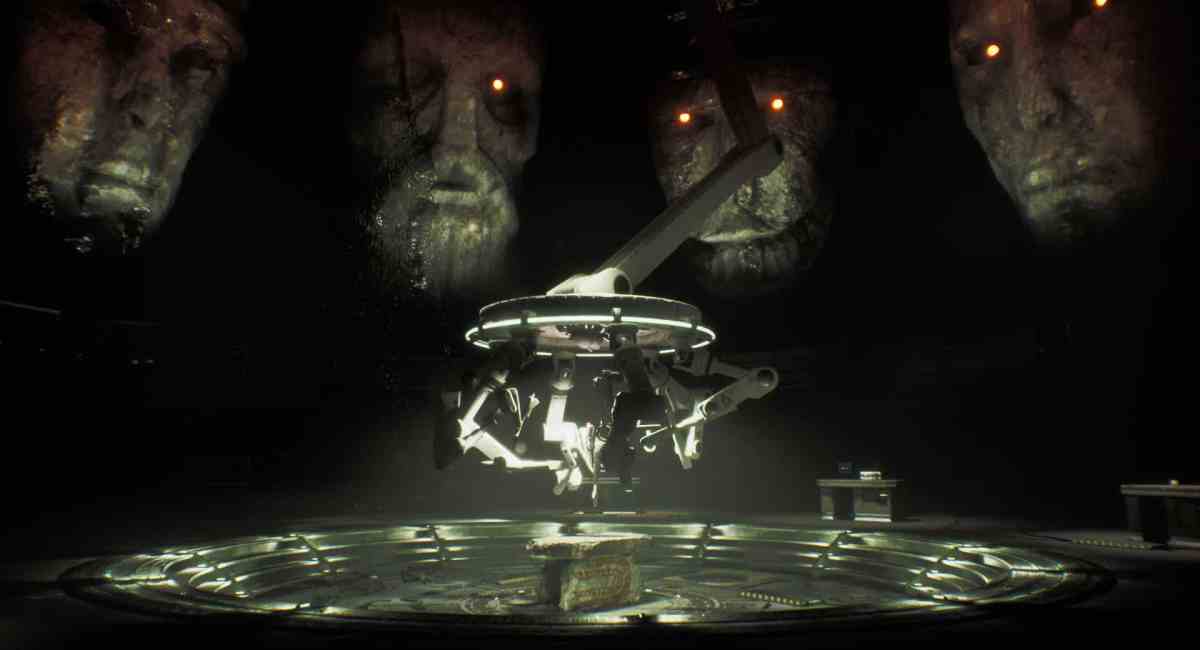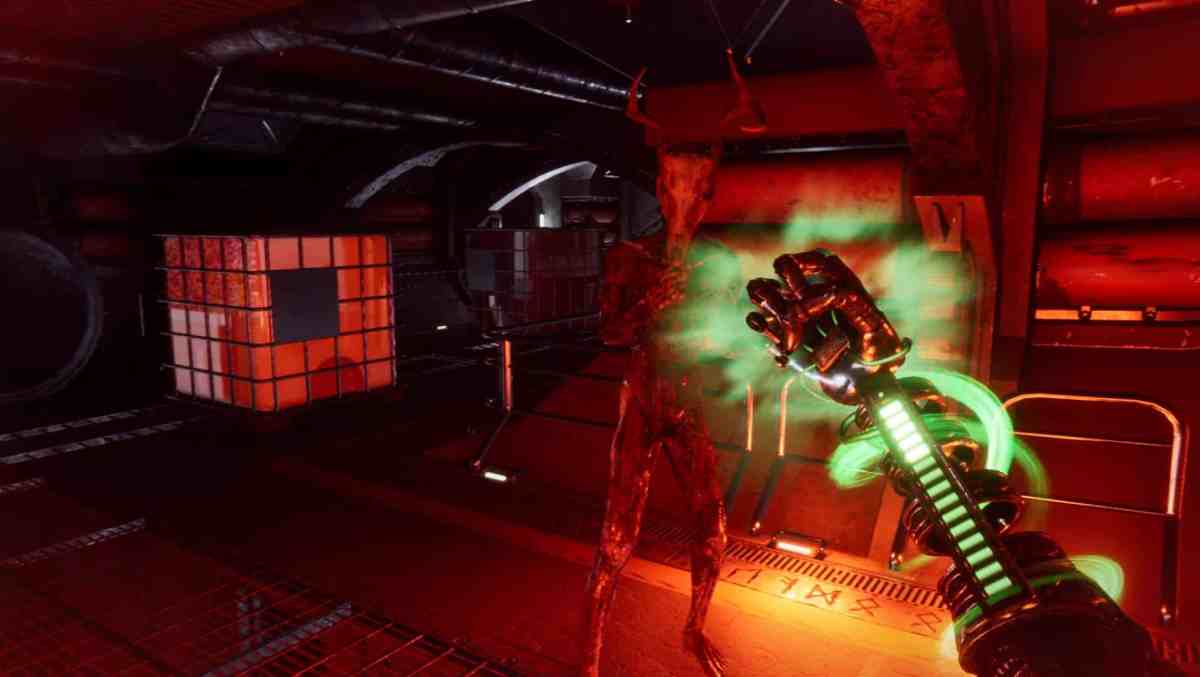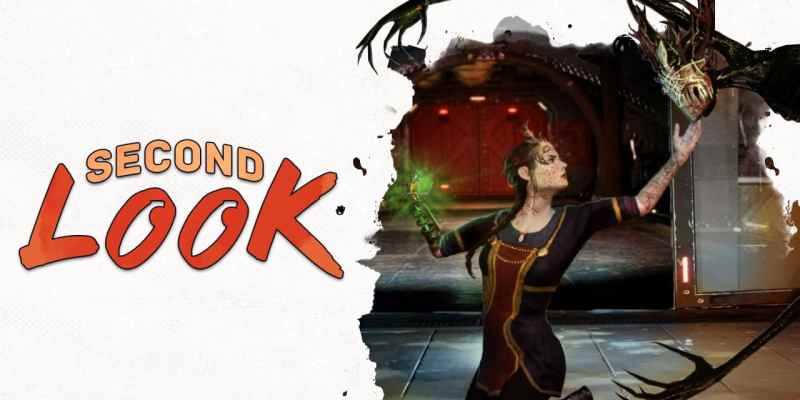Apsulov: End of Gods simply shouldn’t work as well as it does. It’s a first-person horror game not unlike last week’s Observer, yet it’s rarely truly terrifying. Level design and atmosphere range from palpable to verging on unfinished. There’s combat, but it’s more satisfying to unlock a door than to fight the Nordic abominations stalking the halls of the Borr Corp underground facility you awaken in. The plot is campy and absurd yet weirdly engrossing despite wildly varying quality in the voice acting. Yet after it’s all said and done, somehow, Apsulov is a memorable, if sloppy, first-person hybrid of Hellblade and BioShock.
Set in a near future where modern science proves the nine realms of Asgard are real, the introduction of magic to the world has pushed human society to the brink. The world tree is malignant and dying, its branches spreading like tumors through the earth, and Midgard’s last hope is you — an amnesiac girl with a cybernetically enhanced eye and, in short time, a Cyberpunk 2077-worthy robotic arm that can blast magical energy. You’ll be hard-pressed to survive though, as increasingly dangerous arcane threats wait around the corner, haunting every blood-strewn hall.
To Apsulov: End of Gods’ credit, there hasn’t been a lot of exploration like this into how to integrate special abilities and the limited resources of survival horror into a modern project. Most would be content with handing players a gun, but Apsulov instead ties Etrium, your primary resource, into everything you do. Want to unlock a door? That’ll cost you a bar of Etrium for every attempt. Want to blast an enemy? You’ll have to have saved up and then charge several bars of Etrium to banish their body. Want to keep them from respawning too? Well, that’s gonna cost another blast to exorcise their spirit, and you better hop to it as they’ll regenerate quickly!
This gets even trickier when you come across a foe with a cybernetic passkey buried in their wrist: If you take them down, recovering their chip might grant you more rooms to explore. While most doors can be hacked, others require either a four-digit code or an access chip. It’s never quite full-on Metroidvania, but Apsulov isn’t purely a linear experience. Backtracking to unlock previously inaccessible doors is not only possible, but encouraged. New Game Plus is quickly offered to you upon completion to try for higher difficulties and to find any secrets you might’ve missed. Fortunately, it’s in exploration that Apsulov offers some of its best moments.
As I said, Apsulov: End of Gods is far from scary. This ironically works in its favor as you’re more inclined to seek out all the surprises along the way. Combined with its unconventional gameplay, the novelty of each chapter and the different Asgardian worlds you’ll venture through is remarkable: Hunting Helheim’s protectors in a blood trial as unholy flames burst out of the stonework. Dodging the freezing gaze of freshly awakened Jotun. Crawling through the gizzard of a sickly worm, its spawn biting at your heels.
Between your mythological escapades, the cursed immortal scientists of Borr Corp have almost all gone mad, clawing at their flesh and despising their miserable, unending existence. Oh, and the giant wolf Fenris has been resurrected as a beast like out of Resident Evil for good measure, sent to stalk you. Yet amid all this, you often have just enough power available to either sneak past or blast an opening before hightailing it out. Refreshingly, the amnesiac protagonist you inhabit, cloned from the DNA of a girl named Alice, is just as kickass as the gameplay allows, feeling like a modern Norse Ellen Ripley. Her voice acting is solid, yet sparse, which is what I wish I could say for the rest of the cast.

Apsulov: End of Gods is briskly paced, which is fortunate because even in its brief runtime of around five hours, several characters outweigh their welcome. The most questionable game design decision is that the primary NPC you interact with, the company CEO Erik, is voiced by the game’s lead designer. While sometimes developers can provide solid voice acting, this clearly was not the ideal choice.
The contrast in voice acting quality is drastic across the board, with most of the male vocal talent sounding like in-house developers while all the women seem to be professionally voiced. If it was a cost-saving measure to ensure the lead would have a great actress, I can get behind that, but it’s still a tad egregious given Erik has the lion’s share of any spoken dialogue. The sole exception to this is the main antagonist, whom I won’t spoil, but rest assured that he truly captures a sense of dread and maliciousness that’s worthy of a story this intriguing.

This inconsistency in quality is what really holds Apsulov: End of Gods back from being a perfect indie gem. The responsive plop of trying to use Etrium on a door is far more intuitive and satisfying than the charge attack against enemies. A late-game upgrade to your attack helps this to a certain extent, but it feels like an ill-tuned Plasmid from BioShock when I get the feeling it’s supposed to be like an empowering last-ditch option. Damage received is also oddly muted whereas running, jumping, and the minute movements of your robotic hand all sell the experience well.
All the same, I love the idea of making a limited gameplay resource that’s equally valid for combat and exploration; it’s something a potential sequel teased in a post-credits scene could flesh out. And that sequel should happen, as Apsulov is remarkable. The story potential that the closing events of the game introduce could enable either a more action-packed or mystical experience. As it stands though, Apsulov is a fascinating journey. Flawed, absolutely, but still one worth taking if you’re a fan of mythology, magic, and cyberpunk.
